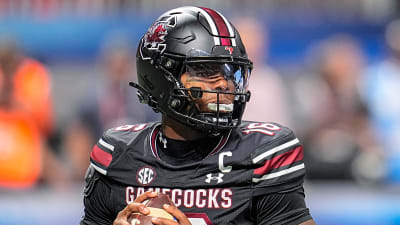
How media rights packages accelerated the Pac-12's collapse
Some 44 years after it killed the radio star, video claimed another victim: the Pac-12. While the speed at which the conference fell apart is surprising, two key moments from 2022 hurled us onto this path.
In August, the Big Ten scored a massive seven-year, $7B media rights package with Fox, CBS and NBC to fully lock down those networks from 2024-29, once CBS' rights to the SEC expire.
"We will have three clearly defined pockets of Fox at noon, CBS at 3:30 [ET] and NBC in prime time. That was important to me, that we have window partners," Big Ten commissioner Kevin Warren told ESPN at the time of the agreement.
Then, in October, the Big 12 struck gold with its six-year, $2.28B media rights package with ESPN and Fox, which pays its members $31.7M annually.
Despite some within the Pac-12 sounding optimistic about the conference's ability to receive a better deal than the Big 12, language in the Big 12's ESPN deal, in particular, incentivized the conference to expand while also giving the network little reason to negotiate with the Pac-12.
ESPN agreed to a pro rata clause in the Big 12 deal, which means the network adds $31.7M per "Power Five" program added.
For ESPN, it didn't make financial sense to negotiate with the Pac-12 when it could sit on the sidelines and allow the Big 12 to poach some of the conference's schools, maintaining a presence on the west coast at a fraction of the cost.
The Big Ten's contract with CBS, Fox and NBC doesn't include a pro rata clause and Oregon and Washington will receive a smaller portion of the TV revenue through the 2029 season.
With the remarkable money those networks threw at the Big Ten, however, it was unreasonable to expect any of the three to consider the Pac-12 as well. And in the end, they still get to air games from the most popular Pac-12 football programs.
If the deal wasn't as massive, perhaps the Big Ten's members would have been less receptive to sharing profits. Or, maybe Oregon and Washington wouldn't have left if their share was less than the $30 million they will receive.
What's clear is that the media rights deal gave the Big Ten the capital necessary to expand. As for the Big 12, it wisely understood how important securing a rights package was and played the game perfectly, locking in its contract two years before the rights were set to go to market.
Those moves left the Pac-12 with nowhere to turn. It's a cruel ending for a conference that clearly saw the value of television by launching its own network in 2012, two years before ESPN launched the SEC Network and seven years before it launched the ACC Network.
But even the Pac-12 was beat to the punch by the Big Ten, which partnered with Fox to launch the Big Ten Network in 2007. As for the Pac-12 Network, it was the only one independently owned, without the backing of either ESPN or Fox.
"We could have taken the whole ball of content and gone to an NBC/Comcast to try and ... use them as partners to start a network," Pac-12 media advisor Chris Bevilacqua told CBS Sports in 2012.
Instead, the Pac-12 went against the major networks only to emerge as a shell of its former self.
More must-reads:
- Pac-12's student-athletes lost in the realignment shuffle
- Oregon, Washington bolting Pac-12 to join Big Ten
- The 'TDs from Josh Allen or Patrick Mahomes' quiz
Breaking News
Trending News
Customize Your Newsletter
 +
+
Get the latest news and rumors, customized to your favorite sports and teams. Emailed daily. Always free!








